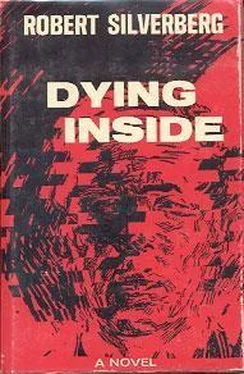Speaking for himself, David Selig can say very little about the psychedelic drugs. He had only one experience with them, and it wasn’t a happy one. That was in the summer of 1968, when he was living with Toni.
Though Huxley thought highly of the psychedelics, he didn’t see them as the only gateway to visionary experience. Fasting and physical mortification could get you there also. He wrote of mystics who “regularly used upon themselves the whip of knotted leather or even of iron wire. These beatings were the equivalent of fairly extensive surgery without anaesthetics, and their effects on the body chemistry of the penitent were considerable. Large quantities of histamine and adrenalin were released while the whip was actually being plied; and when the resulting wounds began to fester (as wounds practically always did before the age of soap), various toxic substances, produced by the decomposition of protein, found their way into the bloodstream. But histamine produces shock, and shock affects the mind no less profoundly than the body. Moreover, large quantities of adrenalin may cause hallucinations, and some of the products of its decomposition are known to induce symptoms resembling those of schizophrenia. As for toxins from wounds—these upset the enzyme systems regulating the brain, and lower its efficiency as an instrument for getting on in a world where the biologically fittest survive. This may explain why the Curé d’Ars used to say that, in the days when he was free to flagellate himself without mercy, God would refuse him nothing. In other words, when remorse, self-loathing, and the fear of hell release adrenalin, when self-inflicted surgery releases adrenalin and histamine, and when infected wounds release decomposed protein into the blood, the efficiency of the cerebral reducing valve is lowered and unfamiliar aspects of Mind-at-Large (including psi phenomena, visions, and, if he is philosophically and ethically prepared for it, mystical experiences) will flow into the ascetic’s consciousness.”
Remorse, self-loathing, and the fear of hell. Fasting and prayer. Whips and chains. Festering wounds. Everybody to his own trip, I suppose, and welcome to it. As the power fades in me, as the sacred gift dies, I toy with the idea of trying to revive it by artificial means. Acid, mescaline, psiocybin? I don’t think I’d care to go there again. Mortification of the flesh? That seems obsolete to me, like marching off to the Crusades or wearing spats: something that simply isn’t appropriate for 1976. I doubt that I could get very deep into flagellation, anyway. What does that leave? Fasting and prayer? I could fast, I suppose. Prayer? To whom? To what? I’d feel like a fool. Dear God, give me my power again. Dear Moses, please help me. Crap on that. Jews don’t pray for favors, because they know nobody will answer. What’s left, then? Remorse, self-loathing, and the fear of hell? I have those three already, and they do me no good. We must try some other way of goading the power back to life. Invent something new. Flagellation of the mind, perhaps? Yes. I’ll try that. I’ll get out the metaphorical cudgels and let myself have it. Flagellation of the aching, weakening, throbbing, dissolving mind. The treacherous, hateful mind.
But why does David Selig want his power to come back? Why not let it fade? It’s always been a curse to him, hasn’t it? It’s cut him off from his fellow men and doomed him to a loveless life. Leave well enough alone, Duvid. Let it fade. Let it fade. On the other hand, without the power, what are you? Without that one faltering unpredictable unsatisfactory means of contact with them, how will you be able to touch them at all? Your power joins you to mankind, for better or for worse, in the only joining you have: you can’t bear to surrender it. Admit it. You love it and you despise it, this gift of yours. You dread losing it despite all it’s done to you. You’ll fight to cling to the last shreds of it, even though you know the struggle’s hopeless. Fight on, then. Read Huxley again. Try acid, if you dare. Try flagellation. Try fasting, at least. All right, fasting. I’ll skip the chow mein. I’ll skip the eggroll. Let’s slide a fresh sheet into the typewriter and think about Odysseus as a symbol of society.
Hark to the silvery jangle of the telephone. The hour is late. Who calls? Is it Aldous Huxley from beyond the grave, urging me to have courage? Dr. Hittner, with some important questions about making pee-pee? Toni, to tell me she’s in the neighborhood with a thousand mikes of dynamite acid and is it okay to come up? Sure. Sure. I stare at the telephone, clueless. My power even at its height was never equal to the task of penetrating the consciousness of the American Telephone Telegraph Company. Sighing, I pick up the receiver on the fifth ring and hear the sweet contralto voice of my sister Judith.
“Am I interrupting something?” Typical Judith opening.
“A quiet night at home. I’m ghosting a term paper on The Odyssey. Got any bright ideas for me, Jude?”
“You haven’t called in two weeks.”
“I was broke. After that scene the last time I didn’t want to bring up the subject of money, and lately it’s been the only subject I can think of talking about, so I didn’t call.”
“Shit,” she says, “I wasn’t angry at you…”
“You sounded mad as hell.”
“I didn’t mean any of that stuff. Why did you think I was serious? Just because I was yelling? Do you really believe that I regard you as—as—what did I call you?”
“A shiftless sponger, I think.”
“A shiftless sponger. Shit. I was tense that night, Duv; I had personal problems, and my period was coming on besides. I lost control. I was just shouting the first dumb crap that came into my head, but why did you believe I meant it? You of all people shouldn’t have thought I was serious. Since when do you take what people say with their mouths at face value?”
“You were saying it with your head too, Jude.”
“I was?” Her voice is suddenly small and contrite. “Are you sure?”
“It came through loud and clear.”
“Oh, Jesus, Duv, have a heart! In the heat of the moment I could have been thinking anything. But underneath the anger— underneath, Duv—you must have seen that I didn’t mean it. That I love you, that I don’t want to drive you away from me. You’re all I’ve got, Duv, you and the baby.”
Her love is unpalatable to me, and her sentimentalism is even less to my taste. I say, “I don’t read much of what’s underneath any more, Jude. Not much comes through these days. Anyway, look, it isn’t worth hassling over. I am a shiftless sponger, and I have borrowed more from you than you can afford to give. The black sheep big brother feels enough guilt as it is. I’m damned if I’m ever going to ask for money from you again.”
“Guilt? You talk about guilt, when I—”
“No,” I warn her, “don’t you go on a guilt trip now, Jude. Not now.” Her remorse for her past coldness toward me has a flavor even more stinking than her newfound love. “I don’t feel up to assigning the ratio of blames and guilts tonight.”
“All right. All right. Are you okay now for money, though?”
“I told you, I’m ghosting term papers. I’m getting by.”
“Do you want to come over here for dinner tomorrow night?”
“I think I’d better work instead. I’ve got a lot of papers to write, Jude. It’s the busy season.”
“It would be just the two of us. And the kid, of course, but I’ll put him to sleep early. Just you and me. We could talk. We’ve got so much to talk about. Why don’t you come over, Duv? You don’t need to work all day and all night. I’ll cook up something you like. I’ll do the spaghetti and hot sauce. Anything. You name it.” She is pleading with me, this icy sister who gave me nothing but hatred for twenty-five years. Come over and I’ll be a mama for you, Duv. Come let me be loving, brother.
Читать дальше












